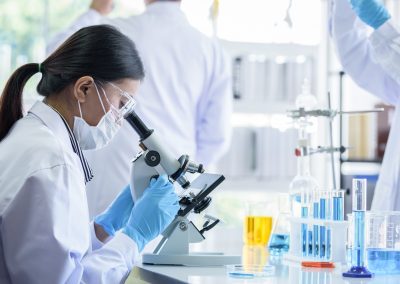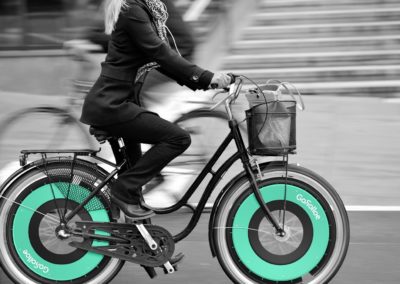Work and wellbeing
Businesses are under huge strains, from managing the bottom line to understanding ways in which they can continue to operate. Taking care of your staff will be a hugely important factor that is under your influence, so check out how Imperial’s ecosystem can help you support your employees’ wellbeing ‘at work’.
The law of unintentional consequences has meant that measures introduced to minimise the direct impact of the COVID-19 pandemic on public health have resulted in new challenges for individuals and companies alike, both for the way that work is delivered and how employees’ wellbeing can be supported.
Economic uncertainty, along with job insecurity or loss, inevitably has an impact on the mental health of those whose livelihoods are under threat. In fact, an ONS report published in August 2020 (based on survey results from respondents followed over a 12-month period) indicated that the incidence of depression may have almost doubled since the pandemic took hold on the UK. There is also growing evidence that difficulties in accessing medical care for condistions other than COVID-19, during and post lockdown, has left people at greater risk of morbidity from illnesses that would ordinarily be treatable if caught at an early stage.
Adapting to new styles of working has also presented new challenges. Employers need to be aware of their obligation to protect the health of employees working both onsite and remotely – and sensitive to how those with underlying conditions may require additional support as long as the pandemic affects our daily lives.
As the furlough scheme draws to a close (albeit with a more modest job protection scheme taking effect on 1 November) and social distancing is necessary for the foreseeable future, it is clear that businesses need to pivot their operations to support their employees’ mental and physical health while safeguarding the longterm viability of their enterprises.
Equally, for organisations that are still able to sustain normal turnovers and workforces, robust help and awareness for employees struggling with health challenges exacerbated or brought about by the pandemic will be essential for ongoing resilience of their organisations.
Technologies for supporting workers’ wellbeing remotely
As well as insights into the behaviours and policies that can improve wellbeing support across an organisation, Imperial’s startups are developing technologies that can be deployed by companies in order to deliver support and wellbeing insights remotely – increasingly important given then uncertainty around the role of physical centralised workplaces for the foreseeable future.
Kaktus.AI is a platform that enables early prediction of mental health-related challenges in the workforce. KaktusBrain is the computing intelligence behind our model which using AI and trained algorithms to identify early indicators of stress or mental illness & learns mental health triggers. Kaktus.AI will revolutionise in-work mental health support with a prediction diagnosis mechanism and early-stage intervention.
Affect.AI is developing a wellbeing support service that is tailored to different experiences of stress and depression, recognising that each individual’s experience will be different and subjective. By deploying advanced machine learning algorithms, bespoke to each service user, the platform provides a much better treatment pathway for its clients.
Wavepaths uses a similar individualised approach, but by using music that adapts to the client’s experience. Using a combination of insights from the Centre for Psychedelic Research at Imperial, as well as research from the Centre for Performance Science and adaptive computer software.
Yokeru – a startup created by alumni of the College – is working with the London Borough of Hammersmith and Fulham to support vulnerable people from the borough during the pandemic. Their software solution prioritised those who were most at risk or in need of dedicated support and enabled staff and volunteers to reach out directly, and quickly, about how they would need to shield and how the Council would be able to provide support. Future applications could work both for staff and employees who need to be contacted about specific or general issues, or even for customers, clients or service users in future scenarios.
Expert insights for wellbeing this winter
At a recent public event, Imperial Lates, experts from Imperial and with insights from around the world shared some ideas for how people can prepare for a different type of winter than those previously experienced. Sharing practical and experimental evidence from studies around the world, and some insights that have informed policies for businesses and organisations as well as wider cultures, to enhance wellbeing and better-adapt to the natural environment.
The importance of sleep for wellbeing
While individuals’ sleep patterns are out of any businesses’ control, advising and encouraging more measured sleep-work patterns this winter – moreso than any other – may be a strong way to engage with genuine improvements for wellbeing.
Sleep research at Imperial covers wide aspects of the topic, from medical research to technologies.
LYS Technologies is a startup from the College looking at this area in particular. Products include a range of wearable devices and smartphone-enabled technologies that can understand the lighting of the local environment to address the circadian rhythm of a workplace, as well as boosting opportunities for staff to optimise their own wellbeing – something that will be increasingly important during the darker winter months, and where facilities managers can’t adjust the work environment centrally.
The pandemic’s impact on daily lives will be greater and more enduring than Brexit
Professor David Miles, explored the different effects of COVID-19 and Brexit on the UK economy at a recent event. Read about “COVID-19 and Brexit – the journey through troubled waters”.
What has been the toll on mental and physical health of locking down the economy?
Professor Carol Propper analyses the consequences for the treatment of illnesses other than COVID-19 and the correlation between recessions and a significant increase in chronic conditions.
Impact of COVID-19 on our daily lives and the economy
Imperial’s Business School is contributing its thought leadership to the unprecedented economic and financial implications of the pandemic.
The Future of Work: Exploring how and where we might do our jobs
Does a surge in home working spell the end of the traditional office? Our panel of experts unpicked the benefits and the challenges of any changes to how and where we do our jobs
How seven minutes of mindfulness each day can make you a better colleague
Laura Noval explores how using mindfulness can improve your interactions at work
Coronavirus: How the UK government can balance the economy and public health
Simplistic restrictions – or their easing – can put both public health and the economy at risk
Who to contact:

Jamie Pombeiro de Sousa
Engagement Manager
For Bioengineering, Mechanical Engineering, Computing, Cyber Security, Data Science and AI



